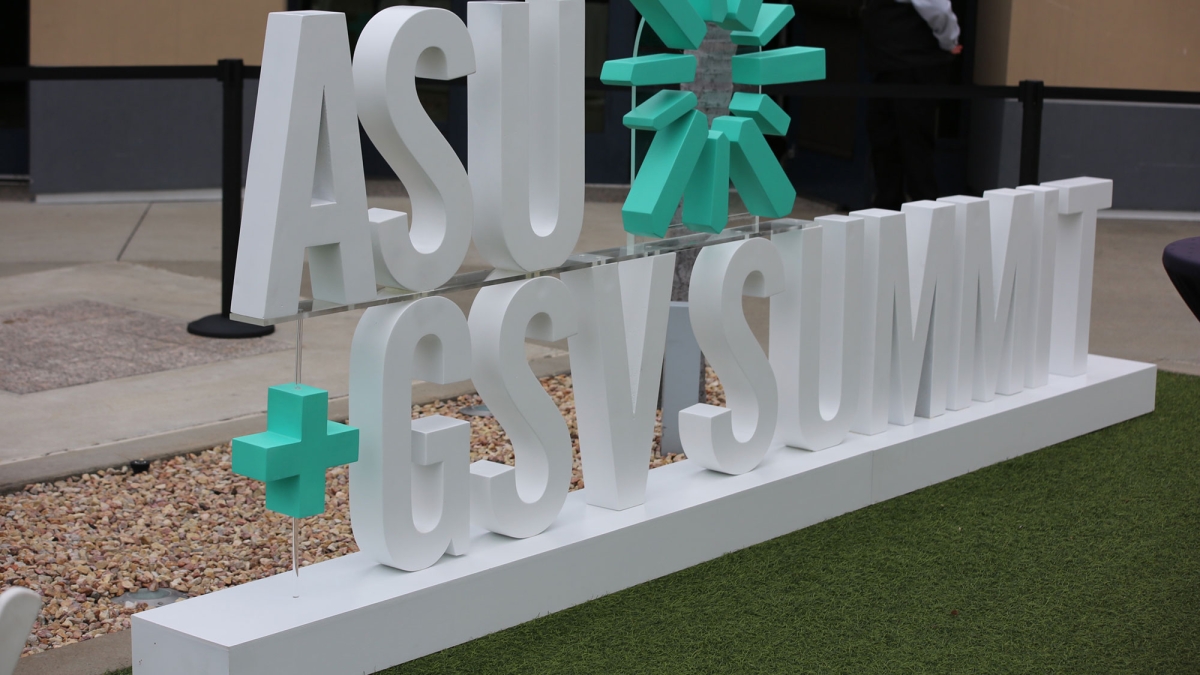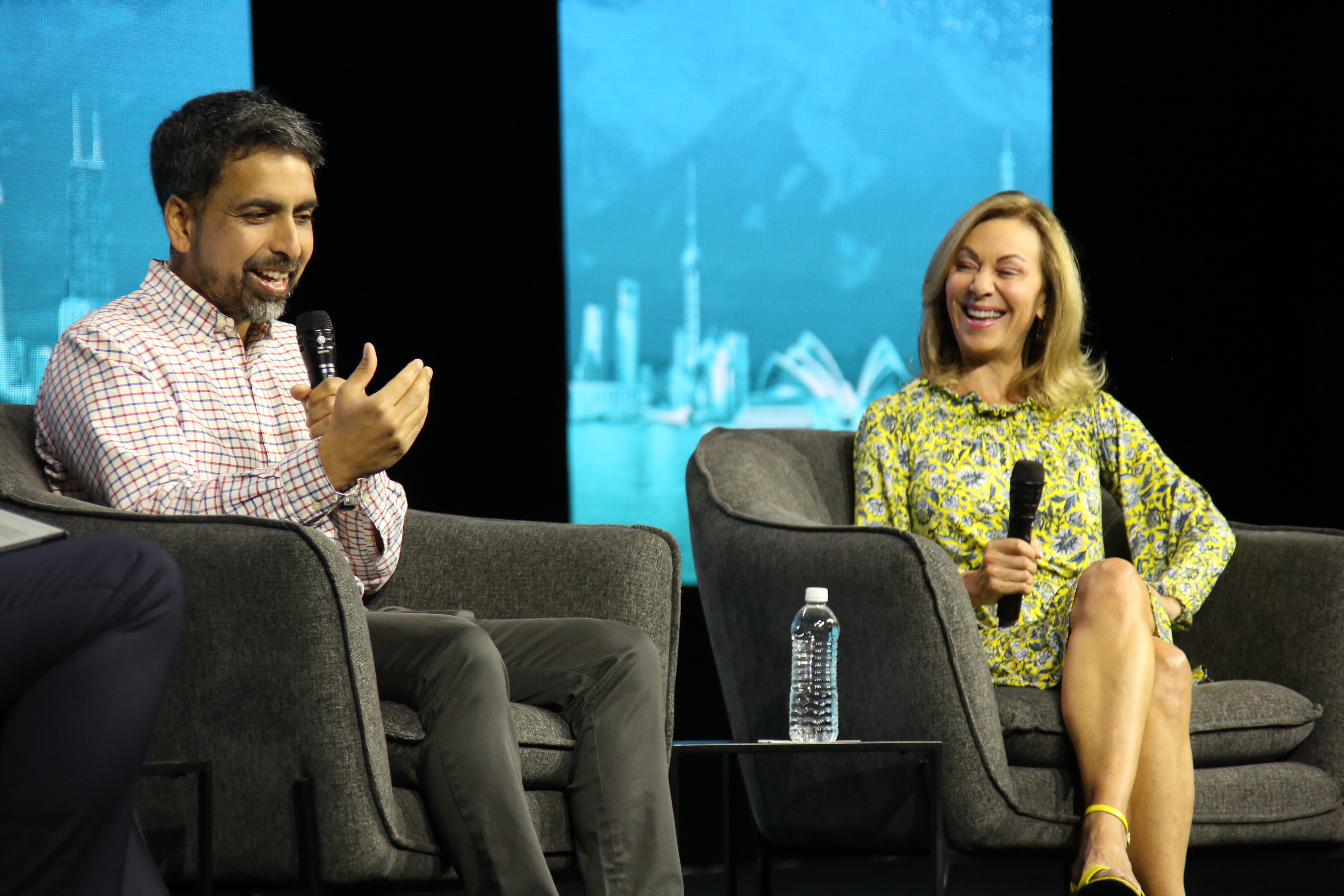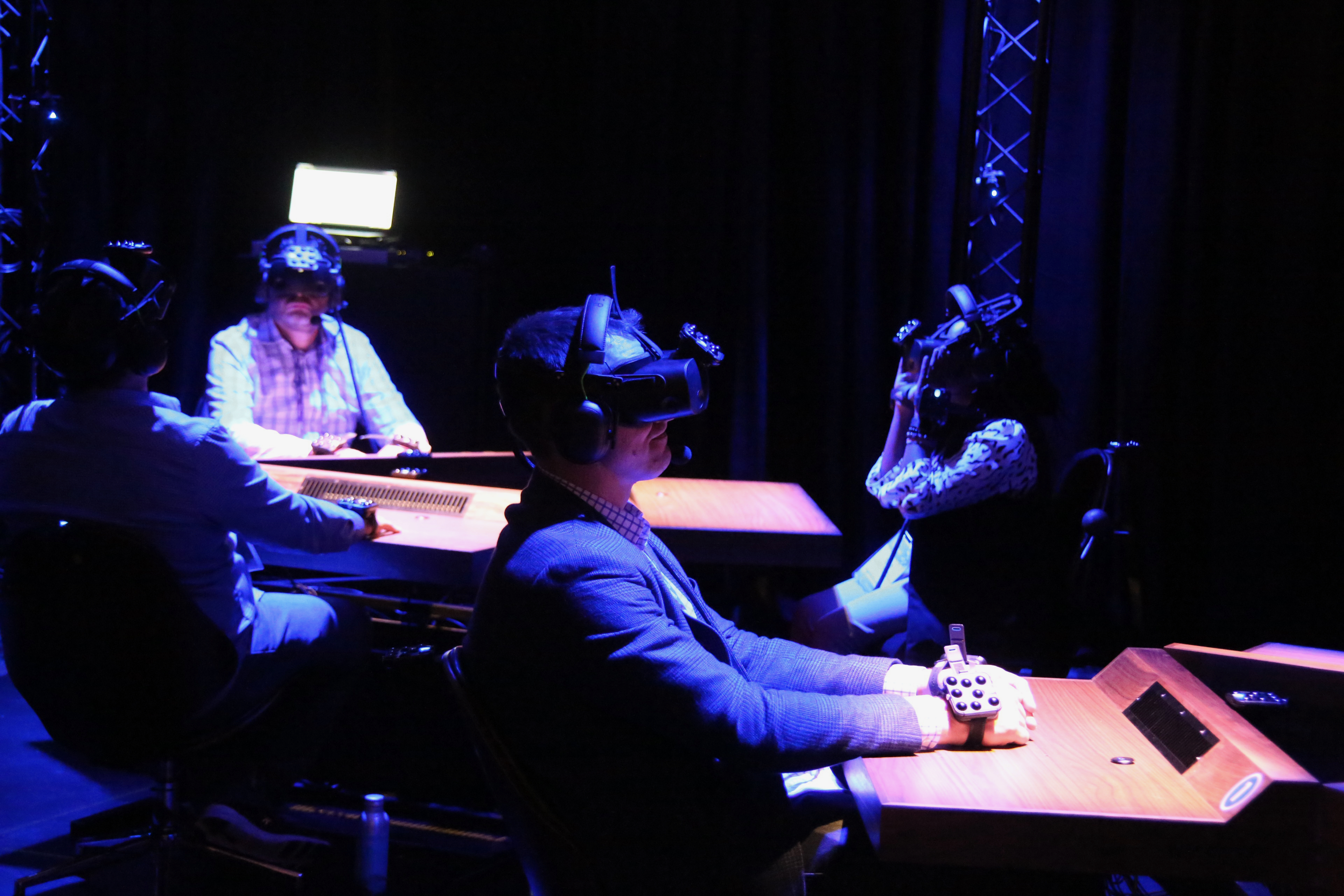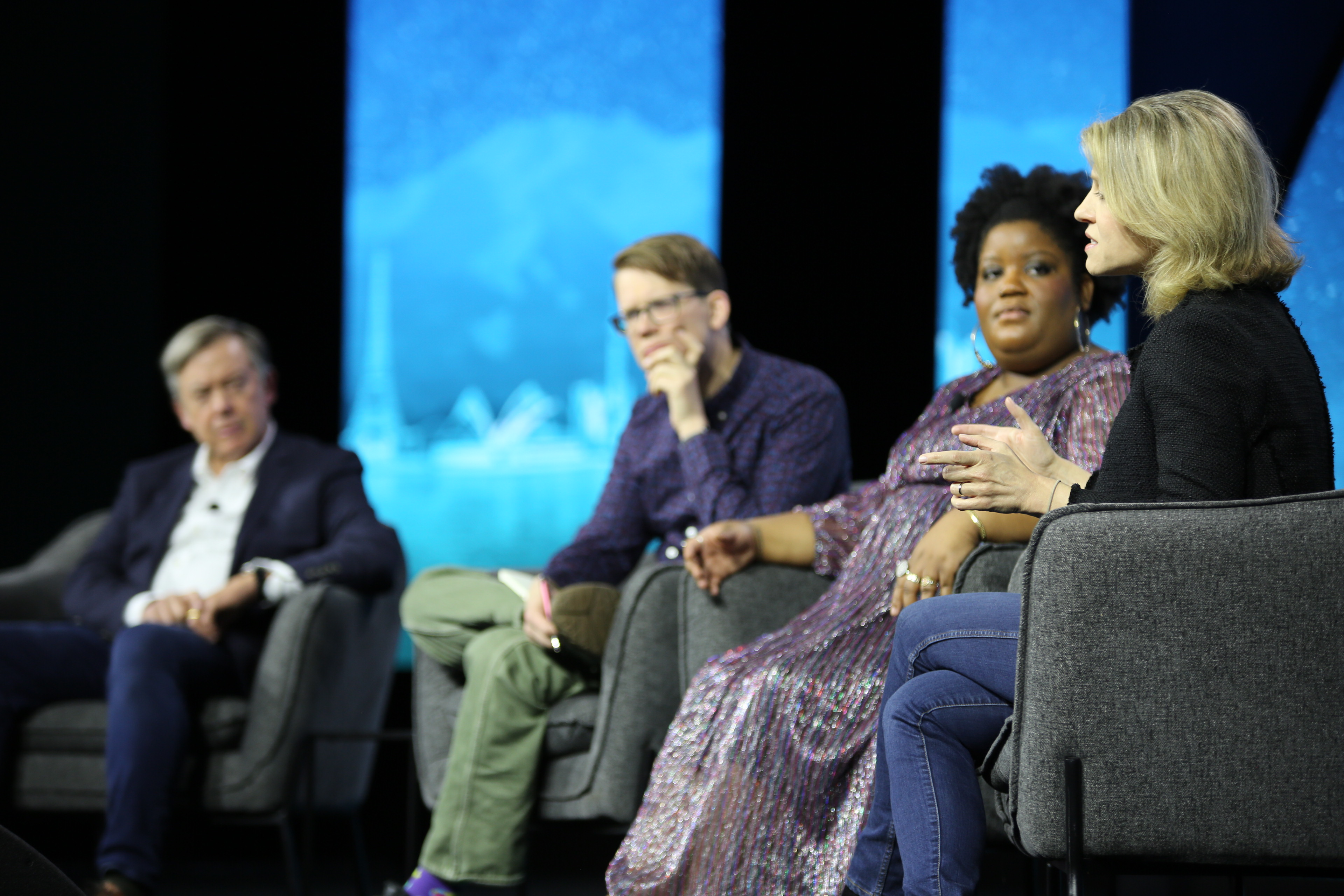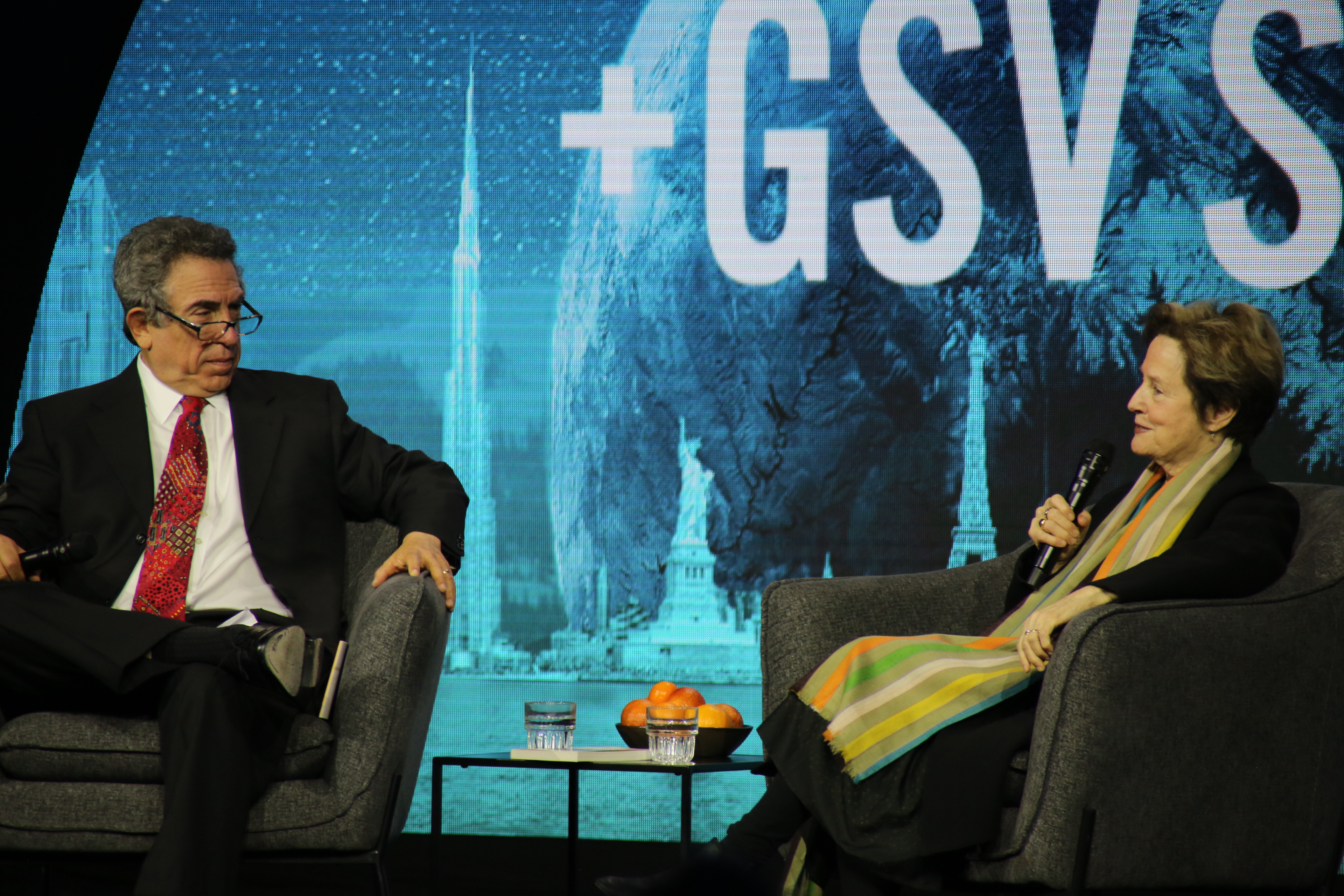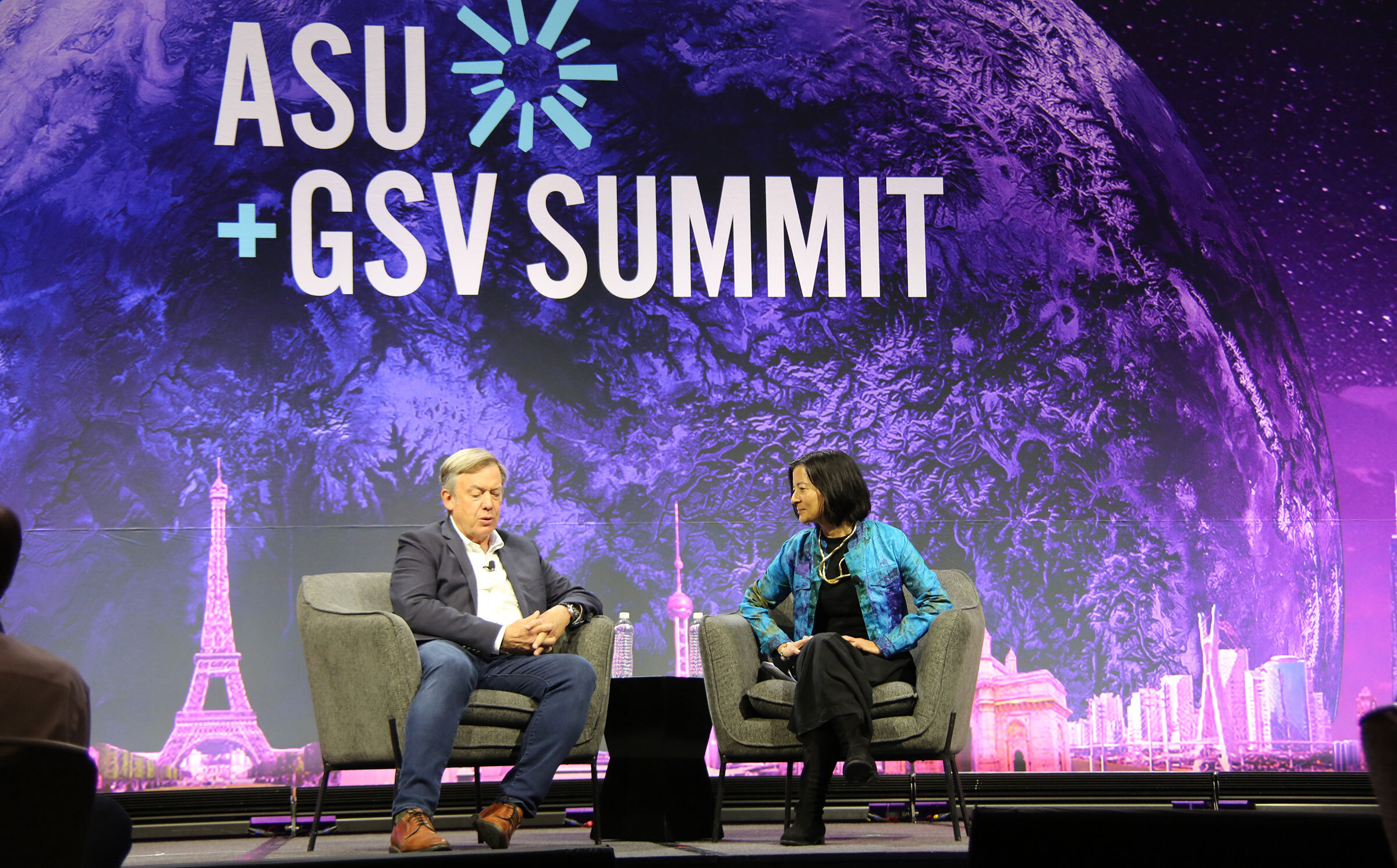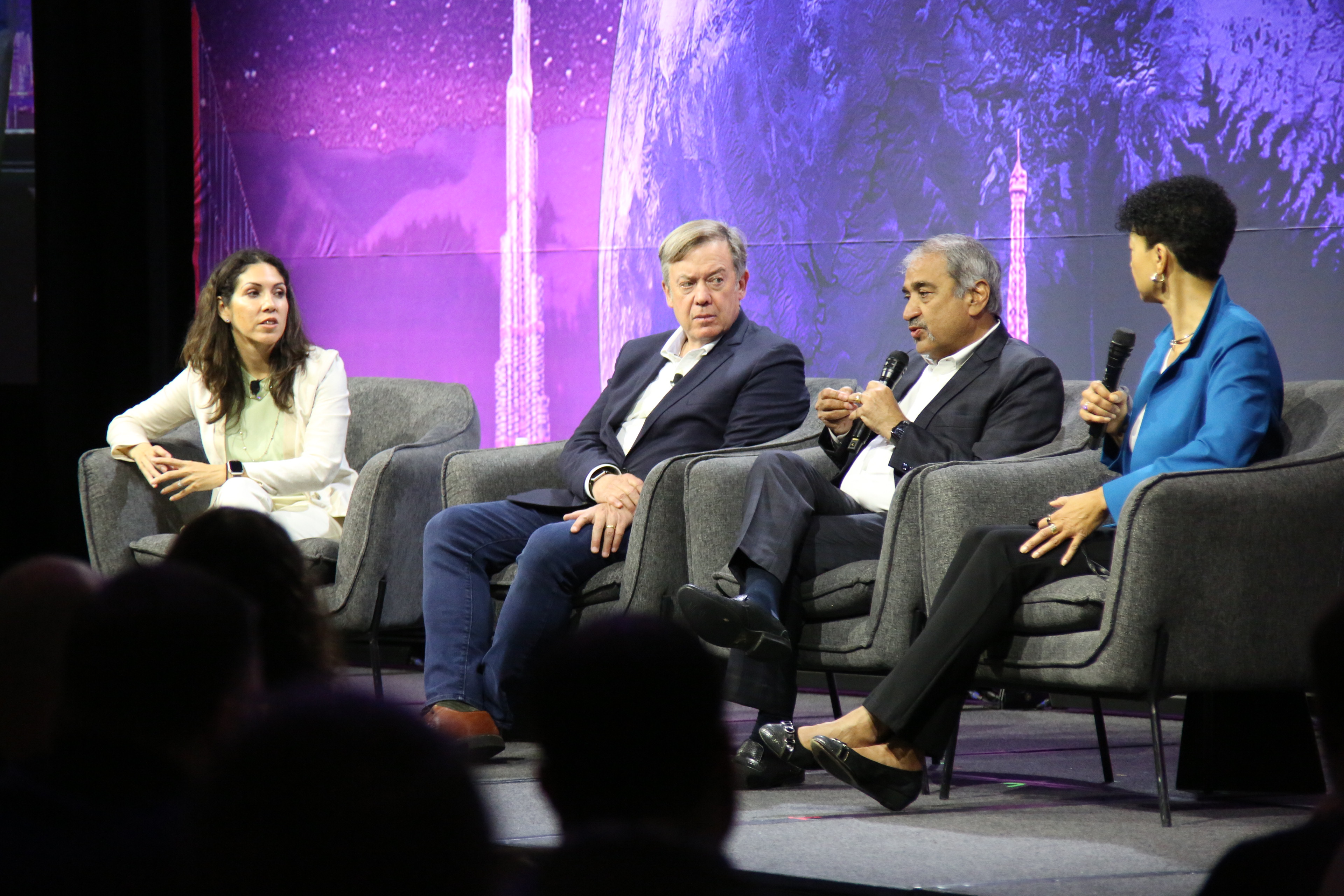Editor's note: We'll be updating this story daily throughout the summit.
This year's ASU+GSV Summit, held in San Diego on April 17–19, is exploring the theme “Brave New World: Imagining a new era in which all people have equal access to the future.”
The education-technology conference drew more than 7,100 in-person attendees and an additional 10,000 watching the panels livestreamed. About 350 higher education institutions are represented, including 22 speakers and 12 deans from Arizona State University.
Here are some panel highlights:
Wednesday, April 19
Blazing New Trails on the Innovation and AI Frontier
The American nonprofit educational organization Khan Academy started using the artificial intelligence platform GPT-4 a few weeks ago for its personalized learning tool called Khanmigo, and ASU Prep Academy was one of the first schools to have access to it.
Sal Khan, founder and CEO of Khan Academy, chatted with Julie Young, managing director of ASU Prep Academy, about the benefits of AI for personalized education.
Young: “I think one of the things we’re increasingly excited about with AI is that it’s going to be such a helper. It will help us dig into teaching and every student and every circumstance so that when we talk about personalized learning, we’ll actually be able to go to the core. I’ve explained that AI is like an MRI for learning.”
Khan: “(GPT) forced everyone to grapple with what’s exciting about it and what’s not exciting about it, and it’s created an urgency in education because, ‘Kids are going to cheat.’ If someone doesn’t put guardrails around it, it won’t capture the benefits, and that was our framework around Khanmigo. The principle is mitigating the risks and putting guardrails around it.
“Everything the students do is monitored by teachers, and we have a second AI monitoring the first AI. You can ask it to do lesson planning or create rubrics. It’s like a teacher’s aide on steroids. Not only can we mitigate the risks, but it will unlock a whole new dimension of learning that was science fiction a few months ago.”
Khan Academy CEO Sal Khan and Julie Young, managing director of ASU Prep Academy, talk about AI learning at the ASU+GSV Summit on April 19.
Young: “We have to train our educators in an entirely different way, and we’re way behind when it comes to that. The technology will push us because the kids will push us. Back in the day when we started online learning, creating an assessment with one question was incredibly time-consuming and expensive, and now I can go to ChatGPT and say, ‘Write me a problem on right angles about baseball’ and two seconds later I have it.
“Teachers want flexibility. I could staff our four digital schools today, and we struggle to staff our brick-and-mortar schools and that’s something everyone should take a moment to think about.
“Public education is designed to be a controlled environment, a replicated environment, an environment that’s very predictable, and we’ve learned that that is the opposite of children in society today. So our teachers are asking for more flexibility, more training, more opportunity to work together.”
Khan: “We’ve already started using AI not just to help the teachers with lesson plans and to help the students but to help communication between the parents and teachers and students. The future is where the teacher talks to AI and says, ‘What are the kids up to?’ And the AI says, ‘Three kids finished that assignment and three kids haven’t, and I helped Billy with binomials and a couple of students are having trouble so let’s put a rubric together.’ ”
Other ASU panels from Wednesday included:
Technology for the Next Education Workforce: Beyond the One-Teacher One-Classroom Model
Carole Basile, dean of ASU's Mary Lou Fulton Teachers College, moderated a panel of education experts — including Brent Maddin, executive director of the Next Education Workforce at ASU, and Ronald A. Beghetto, a professor in the Mary Lou Fulton Teachers College — that explored the technology needed for team-based teaching models.
Scaling Local Partnerships to Accelerate College Attainment
Together with more than 457 local partners, ASU has created low-risk college pathways with a focus on career and general education mastery certificates with the capacity to provide nationwide support to high school students, emerging college learners and non-traditional learners. Audrey Moreno, senior director in ASU's Learning Enterprise, joined panelists for a discussion on how these models can scale to unlock an array of educational opportunities for millions of learners nationwide.
Dreamscape Learn is a collaborative venture between Dreamscape Immersive and ASU, merging the most advanced experiential pedagogy with the entertainment industry's best cinematic storytelling through virtual reality. Michael Angilletta, associate dean for learning innovation at EdPlus at ASU, moderated a group of ASU panelists — including Lisa Flesher, chief of Realm 4 project acceleration at EdPlus; Annie Hale, executive director of the Action Lab at EdPlus; and John VandenBrooks, associate dean for immersive learning at EdPlus — in a discussion about the technology and its potential impacts in the 21st century.
ASU+GSV attendees participate in a Dreamscape Learn demo.
Tuesday, April 18
Accelerating Equity in Higher Education on Youtube
Earlier this year, Arizona State University partnered with YouTube and Crash Course to offer college credit for courses that are on the Study Hall YouTube channel, as a way to make college more accessible and lower in cost.
In a Tuesday morning session at the ASU+GSV Summit, ASU President Michael Crow moderated a panel discussion on what this inclusive, scalable platform means for the future of higher education.
Crow: “There are technologies that have come along that have enabled us to reach almost everyone all the time with ubiquitous information. There is huge resistance to the notion of a highly egalitarian, highly democratic, highly autodidactic empowerment through new kinds of learner systems.”
Katie Kurtz, managing director and global head of learning at YouTube: “We realized that just increasing access and affordability do not ensure student success. We learned that inspiration and motivation have to be pieces of the puzzle. Also learning is better when done with a community, and that’s where Crash Course comes into play.
“Because of all this intrinsic motivation, there tends to be a notion among those in formal education that supplemental education is important, but it’s supplemental to the core. What if, for the learner, supplemental learning is the core?”
Katie Kurtz (right), managing director and global head of learning at YouTube, speaks during a panel on higher education and Youtube, while (right to left) Danielle Bainbridge, assistant professor of theater at Northwestern University, Hank Green, co-founder of Crash Course, and ASU President Michael Crow listen at the ASU+GSV Summit on April 18.
Hank Green, YouTube star and co-founder of Crash Course: “There’s this feeling I get every time someone says to me, ‘You taught me this.’ Teaching is a lot of things and I’m doing one of them. I think that person is basically saying, ‘I ultimately taught myself a lot of biology and used some of the tools you created.’ There’s a huge amount of value in figuring out how to teach yourself.”
Danielle Bainbridge, assistant professor of theater at Northwestern University and host of the history course in Crash Course: “I think a lot of my approach as a learner when I was going through the college process was that college was a competitive process, a game I had to win against other students. I had to beat out other people. By the time I got to grad school, I was disenchanted with that model.
“I wanted to do something that felt meaningful to me and brought education to a wider audience.
“I think some of my ideas are showing people that this is viable and it’s vibrant. I think oftentimes, people trained in the traditional system think public-facing work is dumbed down. The word ‘rigor’ makes me so crazy because it’s usually utilized to say, ‘things behind a paywall’ or ‘not accessible to everyone.’
“If we can change that mindset and show people that this work is of equal value if not more valuable than some of the work behind a paywall, we’ll get more people involved.”
A Conversation with Farm to Table Icon Alice Waters
Alan Arkatov, a senior advisor to ASU President Michael Crow and the founding director of Center EDGE (Engagement-Driven Global Education), had a conversation with American chef Alice Waters about her history as a food and education activist. She created Chez Panisse 50 years ago, is a pioneer in farm-to-table eating, and founded the Edible Schoolyard and School Lunch Initiative.
Waters: “I wrote the book ‘We are What We Eat’ two years ago during the pandemic and I wanted to know really what happened in this country that we have industrialized our school system like our farmers. This is only a phenomenon since about 1950. Before that time everybody ate locally produced food.
“It was very important that I went to France in 1965 because it was a slow-food nation. At that time there, kids would come home and have lunch with their parents for an hour in the middle of the school day.
“When I came back I said, ‘I want to live like the French.’ I started looking for that food and I couldn’t find it. I thought naively that if I opened a little French restaurant I could find that food, and I did when I met the local organic farmers and ranchers and fishers, and we started buying food directly from them.
“I had an opportunity when an enlightened middle school principal in Berkeley wanted me to create an edible garden. I wanted a kitchen classroom and garden classroom so kids could learn academic subjects in the context of the kitchen or garden. They might taste a raspberry in biology class or make hummus in a geography class.
“And when you think about what could be changed that would directly affect climate and health, you come to food and the growing of food and the way that it is fed to students.”
American chef Alice Waters talks to moderator Alan Arkatov, a senior advisor to ASU President Michael Crow and the founding director of Center EDGE, about her pioneering work in farm-to-table eating.
Arkatov: “In addition to being an antidote to the constant state of being online, this is a business model that makes sense, that’s good for the community and brings people together for the local farmers.
“Ideas are the easy part, it’s always about the execution. There are folks here who can figure out the procurement problem. Next year, we would like to hear from those who come up with the best solutions that are implantable for a procurement system for K–12 and one for higher education.”
Other ASU panels on Tuesday included:
A New Design for Local Opportunities and National Impact: The promise of the ASU Local Model
The ASU Local model reshapes the landscape of higher education for underserved learners and their families by offering the opportunity to stay connected to and grow their home community while pursuing a bachelor’s degree from a major public research university. Moderator Patrick Rossol-Allison, associate vice president of strategic initiatives at ASU Learning Enterprise, spoke with panelists Taylor Pineda, director of strategic partnerships at ASU Local; Mike Muñoz, superintendent and president of Long Beach City College; and Sarah Belnick from the ECMC Foundation about the current successes and challenges of the ASU Local model and its potential for having a lasting impact on the U.S. higher education system.
Workforce Development in the Digital Age: University-based perspectives in the U.S. and Worldwide
New programs, models and learning experiences need to be developed by higher education institutions on a domestic and global basis to meet learners, organizations and societal needs. Moderator Marco Serrrato, associate vice president of ASU Learning Enterprise and professor of practice at the Thunderbird School of Global Management spoke with Todd Sandrin, vice provost and dean of ASU's New College of Interdisciplinary Arts and Sciences; Raghu Santanam, associate dean of ASU's W.P. Carey School of Business; Monica Sacristan, dean of executive education at ITAM (Mexico); and Juan Arenas, vice rector of corporate training and development at Universidad Tecmilenio about the issue.
Leveling the Playing Field: The Role of HSI’s and HBCUs in Advancing Equity in Higher Education
Nancy Gonzales, ASU executive vice president and university provost talked with Eloy Oakley from College Futures Foundation and Michael Sorrel from Paul Quinn College about the critical role of Hispanic Serving Institutions and Historically Black Colleges and Universities in the national educational landscape, and what other colleges and universities can learn from this intentional work to scale their own efforts to advance equity in education.
Women in Online Learning, a $14 Billion Opportunity
A recent IFC study shows that online is a valuable and accessible tool for women, female caregivers and those without a tertiary degree to develop valuable skills. Annie Hale, executive director of EdPlus at ASU, joined other experts in the digital education space and female leaders of ed tech companies about how they are working to broaden the access and outcomes of online education to reach this underrepresented user base and drive growth in the industry.
Why Aren't More School Districts Pursuing Radical Innovation?
Recent studies conducted by the Center on Reinventing Public Education — which is affiliated with ASU's Mary Lou Fulton Teachers College — on school district pandemic recovery and transformation efforts show that system leaders have ambitious aspirations, but there are many challenges undermining their efforts. Bree Dusseault, principal and managing director at the Center for Reinventing Public Education, spoke with school district leaders, funders and entrepreneurs about what it will take to help district leaders become addicted to innovation rather than the status quo.
Enabling Technologies for the Future of Education
In the internet age, a variety of technologies are at the forefront of not only scaling access to higher education, but also improving the quality of education received by people around the world. Bethany Weigele, chief innovation officer of EdPlus at ASU, spoke with panelists Chris Bennett, global sales director of Academic Publishing at Cambridge University Press; Joseph Nsengimana, director of the Centre for Innovative Teaching and Learning in ICT at the Mastercard Foundation; and Smita Bakshi, zyBooks co-founder and senior vice president of academic learning at Wiley, about how these technologies have the potential to improve equitable outcomes where other interventions have failed.
Monday, April 17
Designing Scalable Education Systems for Africa: Lessons From ASU and the Mastercard Foundation
ASU’s partnership with the Mastercard Foundation is helping to advance education in Africa, a continent bursting with economic opportunity.
ASU President Michael Crow kicked off the ASU+GSV Summit on Monday morning with a conversation with Reeta Roy, president and CEO of the Mastercard Foundation, which focuses on two goals in Africa: improving financial services for poor people and preparing young people for the workforce through education and upskilling.
ASU President Michael Crow and Reeta Roy, president and CEO of the Mastercard Foundation, talk about the Mastercard Young Scholars program at the ASU+GSV Summit on April 17.
Of Africa’s 1 billion people, 60% are under the age of 25, Roy said. About 40% have completed high school, and about 9% have some higher education.
“We all know education is part of nation building. It’s where leaders come from. It’s about economic competitiveness as well as social inclusion,” she said.
Roy said that technology innovation is necessary.
“When you look at the gaps, we can’t build enough schools or train enough teachers or professors. Technology is the force multiplier, enabling access and quality and allowing for relevance,” she said. “ASU has been an innovator when it comes to technology and education.”
Crow noted that dozens of young Africans have come to ASU as part of the Mastercard Young Scholars program, and he listened to one of them speak a few years ago.
“It was one of the most emotional moments I’ve had, listening to this student articulate her plan for the future of Arizona and her country, Zimbabwe, with her talent and her energy,” he said.
Two years ago, Roy moved to Rwanda when the foundation moved its headquarters there. She said the true story of Africa is different from the bleak headlines.
“Some of it is true, but there’s a bigger story under that,” she said. “I see young people creating companies and running for office and continuing their leadership for the city or organization they’re a part of.
“One of my wishes is for more organizations like ASU with whom we could partner, who enter a partnership with the right level of trust building, respect and listening.”
Following the Mastercard Foundation session, Crow then joined Pradeep Khosla, chancellor at the University of California San Diego, and Shellye Archambeau, board director at Verizon, for a panel on "Universities in the New Economy." The panel was moderated Maria Anguiano, executive vice president of Learning Enterprise at ASU.
The panelists discussed how universities are powering industries of the future through research, development and innovation, while partnering with leading enterprises to connect education and training with workforce needs. National-scale research universities in the U.S. have a responsibility for the health of the communities they serve, according to the panelists.
From left: Moderator Maria Anguiano and panelists Michael Crow, Pradeep Khosla and Shellye Archambeau during the session on "Universities in the New Economy."
Other ASU sessions for the day included:
Moving “or” Toward “and”: Breaking Down the False Dichotomy of College or Career
A recent study showed that 56% of Gen Z teens believe a skills-based education makes sense in today’s world. Yet, completing a college degree still remains one of the best predictors of socioeconomic mobility. Maria Anguiano, executive vice president of ASU Learning Enterprise, was joined by Lisa Gevelber, founder of Grow with Google and chief marketing officer of Google — Americas, and Shavar Jeffries, chief executive officer of the KIPP Foundation, to discuss how to move toward a “both/and” structure where people can earn career credentials and simultaneously earn a college degree. The panel was moderated by Ann Kirschner, a senior advisor to ASU President Michael Crow.
Transforming California Schools: A Conversation With State Superintendent Tony Thurmond
Christian Osmeña, vice president of enterprise planning at ASU, spoke with Tony Thurmond, state superintendent of public instruction in California, on how technology can advance progress for the state’s students.
The CHIPS Science Act: Exploring Our Nation's STEM Needs
Sally Morton, executive vice president of ASU Knowledge Enterprise, joined fellow panelists Paula Golden, president of Broadcom Foundation; Robert Simmons, head of social impact and STEM programs at MICRON Foundation; and Jan Morrison, founder and CEO of TIES for a discussion on the need for increased funding for STEM education and research, the importance of diversity and inclusion in the STEM workforce, and the role of industry-academia partnerships in addressing the nation's STEM needs. Panelists also delved into the CHIPS Science Act, legislation that addresses these issues and promotes the growth and competitiveness of the STEM workforce in the United States. The panel was moderated by Ann Kirschner, a senior advisor to ASU President Michael Crow.
Innovating to Address California’s Education Needs
Alan Arkatov, professor of practice and executive director of the ASU Institute for Education Transformation, was joined by leaders of higher education policy in California to discuss college enrollment declines, barriers to access and uneven outcomes in the state. Panelists were presented with the question: How can innovation transform outcomes for Californians?
Photos courtesy EdPlus at Arizona State University
More Science and technology

ASU and Deca Technologies selected to lead $100M SHIELD USA project to strengthen U.S. semiconductor packaging capabilities
The National Institute of Standards and Technology — part of the U.S. Department of Commerce — announced today that it plans to award as much as $100 million to Arizona State University and Deca…

From food crops to cancer clinics: Lessons in extermination resistance
Just as crop-devouring insects evolve to resist pesticides, cancer cells can increase their lethality by developing resistance to treatment. In fact, most deaths from cancer are caused by the…

ASU professor wins NIH Director’s New Innovator Award for research linking gene function to brain structure
Life experiences alter us in many ways, including how we act and our mental and physical health. What we go through can even change how our genes work, how the instructions coded into our DNA are…
